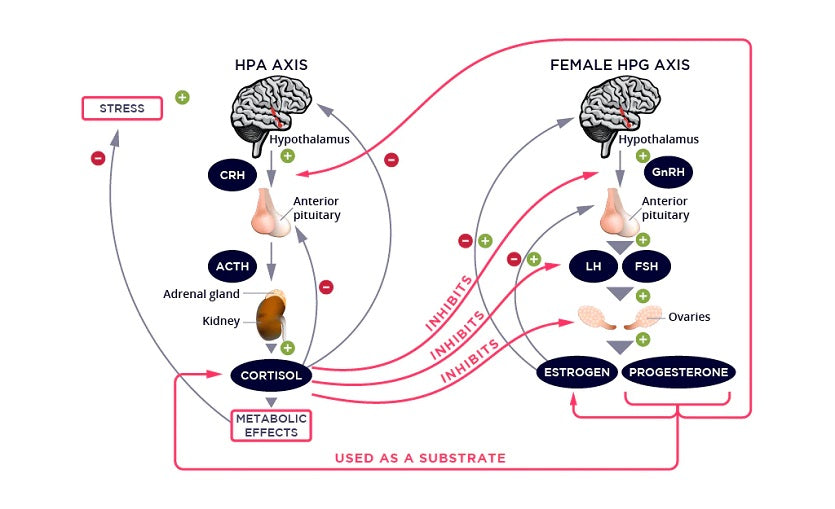A lot of women suffer from heavy bleeding, which tends to lead to IUD insertion, ablation and eventually a hysterectomy.
There are several ways to treat and manage heavy bleeding naturally, which are very effective and can save you a lot of the pain and anguish associated with the current medical approach.
What Causes Prolonged Periods?
Physical Causes
The first thing to check is whether there are any physical causes of the bleeding. Commonly it could be due to fibroids; however, in many cases, there is no physical reason. So go to your GP to get a confirmation of whether there's a physical cause, or if it may be hormonally-based.
The treatment remains the same. However, the time of recovery changes; and you may need some interim medical treatment to stem the bleeding until you can correct the underlying pathology, which I explain below.
Pathophysiology
You need to understand the underlying pathophysiology of why the bleeding is occurring and/or why fibroids have developed.
In most cases, these symptoms occur for the 5 years leading into menopause. Your body starts to produce less progesterone during this phase. At the same time, oestrogen levels stay the same and become unopposed. Meaning oestrogen becomes the dominant hormone in your system.
This leads to a whole range of symptoms including painful breasts, heavy bleeding, fibroids, mood changes, depression, fluid retention and commonly, weight gain.
Progesterone is actually the first treatment option by doctors to try and stem the heavy bleeding. As a short-term treatment, this may be necessary. Long-term use, however, is another story.
Many practitioners who don't understand the effect of long-term progesterone supplementation, suggest progesterone during this phase. Initially, you will feel better. However, the body then adapts to this external source of progesterone and turns off its own production.
This has many consequences in the coming years, including a difficult menopause, prolonged menopause, thyroid dysfunction, adrenal fatigue and depression.
Many women are suffering from progesterone deficiency and unopposed oestrogen from years of progesterone-based contraceptive use.
The Relationship Between Prolonged Periods and Menopause
As you approach menopause the natural, healthy transition is for your adrenals to take over the production of progesterone. Later the adrenals will also take over the production of your oestrogen. However, progesterone is the first hormone to diminish.
It’s a process your body must go through. A natural and necessary process. And by taking progesterone, or having a progesterone IUD inserted, then you're contributing to the actual cause of the problem, which sets you up for a long road of hormonal issues for the next 10, 20 and even 30 years, without the right management.
There's another reason why your oestrogen levels rise. The liver and digestive system need to metabolise oestrogen. If they don't do this effectively, which is very common - then the effects of oestrogen are felt 2 and 3 times, as they are resorbed back into the system. This is often the main cause of fibroid development.
Natural Solutions for Managing Prolonged Periods
-
A plant-based diet is really important at this time. Animal products contain a lot of growth-promoting factors and are also high in naturally occurring hormone levels. A diet high in “greens” such as cruciferous vegetables, and especially broccoli, helps to naturally break down and metabolise oestrogens in your system.
-
Avoiding alcohol is also a necessary step. Alcohol increases circulating oestrogens by 200%, which contributes to oestrogen dominance.
-
Sugar in large amounts damages the liver. Many women develop fatty livers from sugar intake without even drinking alcohol. At this stage of life, it's important to have a healthy liver function, more than at any other time in life.
-
Managing stress is critical. The adrenals must produce the necessary progesterone levels, and when stressed, the body will make cortisol in its place.
Yoga, meditation, reading, exercise and a positive frame of mind go a long way to helping the adrenals to produce adequate quantities of progesterone. If you need extra support, the herbs in Happy Calm are ideal.
- Regulate the Hypothalamic-Pituitary axis (HPA). This is the hormonal control centre in your brain. It is proposed that this is the mechanism of action of many herbal medicines which assist in the regulation of menstrual cycles.
In combination with improved hormone metabolism via the liver & gut, a plant-based diet, and managing stress levels, then in most cases, heavy bleeding can be managed effectively.










Leave a comment
This site is protected by hCaptcha and the hCaptcha Privacy Policy and Terms of Service apply.